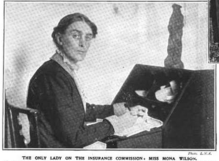Mona Wilson
Mona Wilson (29 May 1872 – 26 October 1954) was a British civil servant and author. She is known for her scholarly work, including The Life of William Blake (1927) and other biographies of literary and historical figures. As a civil servant, she was one of the first women in the United Kingdom to earn equal pay for her work.

Life
Wilson was born in Hillmorton Road, Rugby to James Wilson (headmaster of Clifton College ) and Annie Elizabeth Moore. She was educated at Clifton High School, Bristol; St Leonard's School, St Andrews; and Newnham College, Cambridge.[1] Wilson became interested in social and industrial problems after she graduated and went on to join the Women's Trade Union League.[1] Wilson became secretary of the Women's Trade Union League in 1899.[2]:71
After being appointed to the National Insurance Commission in 1911, she received a yearly salary of £1000, making her the highest-paid woman civil servant of the time and one of the first women to receive equal pay in the United Kingdom.[3] In 1917, she was involved in creating a mothers' Pensions bill.[4] In 1919, she retired from civil service and began to work on her writing.[5]
In 1932, she was made an Associate of Cambridge University.[6]
Writing
She wrote several scholarly works after her retirement from the civil service in 1919, including The Life of William Blake (1927),[7][5]:73 which went through several reprintings and remained popular for several decades.[3] Her biography of William Blake was considered to be very accessible by Angus Whitehead.[5] The Guardian wrote that Wilson "told his story more fully and sensibly than anyone else."[8] The Observer states that her biography was "the most satisfactory since Gilchrist."[9]
Wilson was featured in Grand Tour: A Journey in the Tracks of the Age of Aristocracy (1935), where she contributes a piece about the Wife of Bath.[10]
Jane Austen and Some Contemporaries (1938) describes the biographies of Jane Austen and several women who were her contemporaries.[11] The book was described by The Guardian as being very thorough in its understanding of the people of Austen's time, though a little difficult to follow if the reader is not familiar with the time period.[12]
Wilson also published a short story under the nom de plume "An Ordeal" in The Nation in 1909 and a novella "The Story of Rosalind Retold From Her Diary" as "Monica Moore" in 1910.[2]:73
Publications
- Our Industrial Laws: Working Women in Factories, Workshops, Shops and Laundries and How to Help Them. London: Duckworth. 1899. OCLC 923922965.
- These Were Muses. London: Sidgwick and Jackson. 1924. OCLC 884049119.
- The Life of William Blake. London: The Nonsuch Press. 1927. OCLC 973439003.
- Sir Philip Sidney. London: Duckworth. 1931. OCLC 753238584.
- Elizabeth, Queen of England. Edinburgh: Peter Davies Ltd. 1932. OCLC 606433685.
- Victoria, Queen of Great Britain. London: P. Davies Ltd. 1933. OCLC 2194597.
- Jane Austen and Some Contemporaries. London: Cresset Press. 1938. OCLC 222021464.
- Johnson, Prose and Poetry. London: Rupert Hart-Davis. 1950. OCLC 852820674.
References
- Hartley, Cathy (15 April 2013). A Historical Dictionary of British Women. Routledge. ISBN 9781135355333.
- Whitehead, Angus (2012). Blake 2.0: William Blake in Twentieth-Century Art, Music and Culture. Palgrave Macmillan. ISBN 9780230280335.
- Mona Wilson. Oxford Dictionary of National Biography. doi:10.1093/ref:odnb/70137.
- Pedersen, Susan (25 August 1995). Family, Dependence, and the Origins of the Welfare State: Britain and France, 1914–1945. Cambridge University Press. p. 169. ISBN 9780521558341.
- Whitehead, Angus (24 January 2012). "'New Matter': Mona Wilson's The Life of William Blake 85 Years On". In Clark, Steve; Connolly, T.; Whittaker, Jason (eds.). Blake 2.0: William Blake in Twentieth-Century Art, Music and Culture. Springer. ISBN 9780230366688.
- "Miss Mona Wilson". The Guardian. 30 October 1954. p. 8. Retrieved 2 October 2017 – via Newspapers.com.
- Mona Wilson (1932). The Life of William Blake. R. O. Ballou.
- "Blake". The Guardian. 1949. p. 3. Retrieved 2 October 2017 – via Newspapers.com.
- Evans, B. Ifor (26 June 1949). "A New Kind of Man". The Observer. p. 7. Retrieved 2 October 2017 – via Newspapers.com.
- Laver, James (1 December 1935). "Grand Tour". The Observer. p. 23. Retrieved 2 October 2017 – via Newspapers.com.
- Hayward, John (21 August 1938). "Pre-Victorian Girlhood". The Observer. p. 5. Retrieved 2 October 2017 – via Newspapers.com.
- Stocks, Mary (6 September 1938). "In the Days of the Regency". The Guardian. p. 5. Retrieved 2 October 2017 – via Newspapers.com.